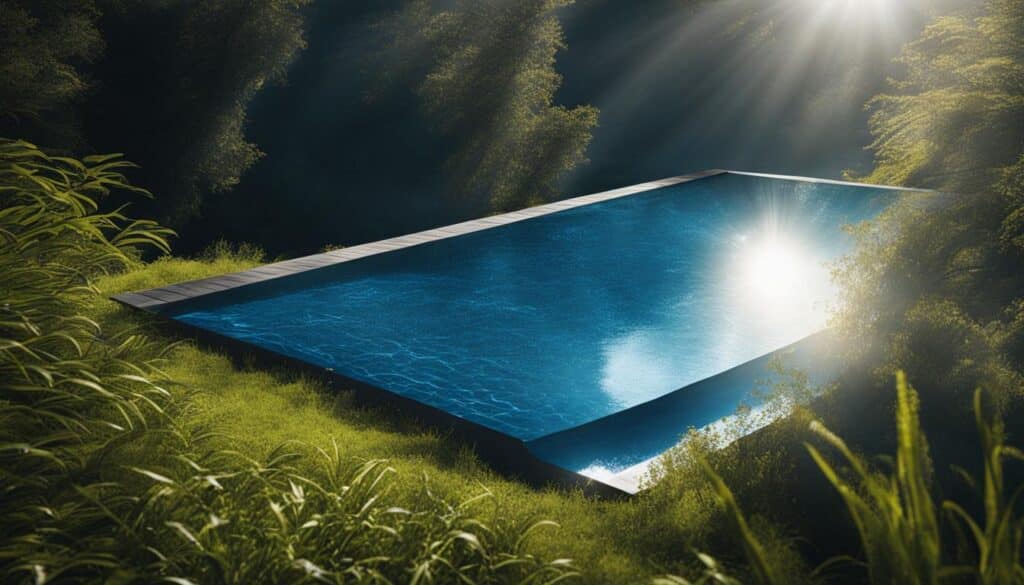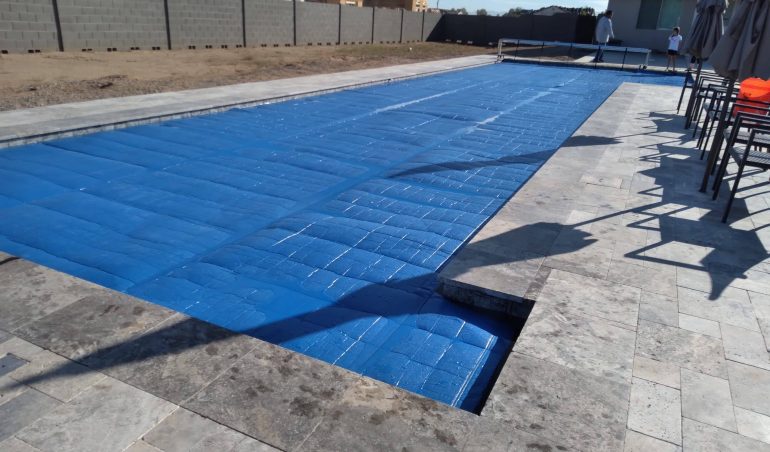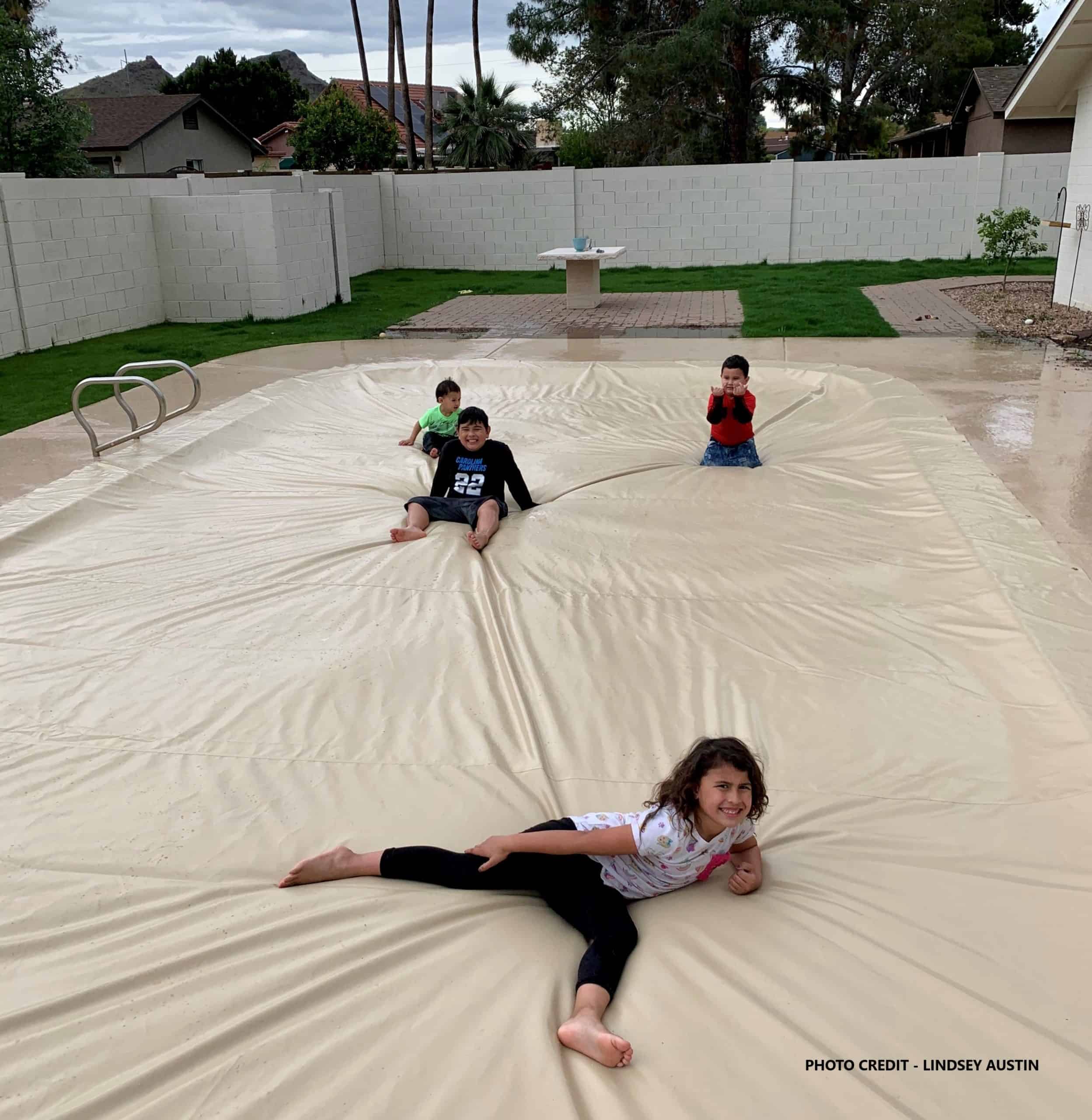When it comes to maintaining your swimming pool, a solar cover is an essential piece of pool equipment. Not only does it protect your pool from evaporation, but it also helps to control the temperature and optimize energy efficiency. However, choosing between a clear or blue solar cover can be a tough decision. Let’s explore the differences between these two options to determine which one is best for your pool.
Key Takeaways:
- A solar cover protects your pool from evaporation and helps control the temperature.
- Choosing between a clear or blue solar cover depends on your specific needs and preferences.
- Clear solar covers allow more light energy to penetrate the water, resulting in increased heat absorption.
- Blue solar covers are better at trapping heat in the pool and providing insulation for optimal heat retention.
- Consider your desired pool temperature, energy efficiency, and UV protection when selecting a solar cover color.
How Solar Covers Work
A pool solar cover is a crucial component in maintaining the optimal temperature and overall efficiency of your pool. Understanding how solar covers work will help you make an informed decision when choosing the right one for your pool.
When exposed to sunlight, a solar cover absorbs heat energy from the sun’s rays. This heat is then transferred to the pool water through a process called conduction. The solar cover acts as a barrier, preventing direct contact between the sun and the water, thus minimizing heat loss.
One of the primary benefits of a solar cover is its ability to reduce water evaporation, which can account for a significant amount of heat loss in a pool. By covering your pool when it’s not in use, a solar cover can help reduce evaporation by up to 95%, effectively conserving the heat energy in the water.
In addition to heat retention, solar covers also provide protection against UV radiation. UV rays from the sun can degrade chlorine levels in the pool, leading to imbalances in chemical composition. By blocking UV radiation, a solar cover helps maintain proper chlorine levels, ensuring a healthy and balanced pool environment.
As shown in the image, the solar cover acts as a shield, absorbing sunlight and transferring the heat energy to the pool water. This efficient mechanism not only keeps your pool warm but also minimizes the use of additional energy sources to heat the water.
Key Points:
- A solar cover absorbs heat energy from the sun and transfers it to the pool water through conduction.
- Solar covers help prevent evaporative heat loss, reducing water evaporation by up to 95%.
- They also protect against UV radiation, which can cause chlorine degradation and chemical imbalances in the pool.
Understanding how solar covers work is essential in optimizing pool temperature control and energy efficiency. In the following sections, we will explore the differences between clear and blue solar covers and help you determine which one is best suited for your pool’s needs.
Clear Pool Solar Covers
When it comes to solar covers for your pool, clear options offer specific advantages in terms of heat absorption. These covers allow more light energy to penetrate the water, resulting in increased heat absorption and a warmer pool. The clear design allows sunlight to pass through, harnessing its energy to raise the temperature of the water.
However, it’s essential to consider the potential drawbacks of clear pool solar covers. While they excel at heat absorption, they also transfer most of the UV light directly into the water. This excessive UV light can lead to degraded chlorine levels near the water’s surface, which may require more frequent chlorine treatments to maintain proper sanitization.
To address the potential chlorine degradation, pool owners utilizing clear solar covers must closely monitor chlorine levels and be prepared to adjust their maintenance routine accordingly. This extra attention ensures the pool remains properly balanced and safe for swimmers.
By harnessing the power of sunlight, clear pool solar covers are an effective choice for heat gain. However, it’s important to weigh the benefits of heat absorption against the need for diligent chlorine maintenance to keep your pool clean and safe.
Promoting Heat Absorption
Clear pool solar covers excel at promoting heat absorption due to their ability to allow more light energy into the water. This increased heat absorption can result in a pool that reaches the desired temperature more quickly and maintains that warmth for longer periods. The transparent cover acts as a barrier, trapping the sun’s heat and transferring it to the pool water through conduction.
Addressing Chlorine Degradation
While the heat absorption benefits of clear solar covers are significant, it’s crucial to address the potential chlorine degradation. UV light can break down chlorine molecules, leading to reduced effectiveness in sanitizing the pool. Monitoring chlorine levels and adjusting the maintenance routine can help mitigate any adverse effects caused by UV light penetration.
Understanding the impact of clear pool solar covers on heat absorption and chlorine degradation is essential in making an informed decision for your pool. By weighing the benefits against the necessary maintenance, you can determine if a clear solar cover is the right choice for optimizing heat gain in your pool.
Blue Pool Solar Covers
When it comes to trapping heat in your pool, blue solar covers are the superior choice over clear covers. Their ability to absorb more UV light and heat allows them to effectively insulate the pool and retain warmth. This means that even on cooler days, you can still enjoy a comfortably warm pool.
One of the main advantages of blue pool solar covers is their excellent heat retention capabilities. By absorbing more heat, they ensure that the warmth stays within the pool, reducing heat loss and keeping the temperature consistent. This is especially beneficial during colder months or in regions with cooler climates, where maintaining a warm pool can be challenging.
However, it’s important to note that blue covers also block more pool warming light energy compared to transparent covers. While this may result in less overall heat gain during the day, their superior heat retention compensates for this. Additionally, the UV absorption properties of blue covers help prevent chlorine degradation, ensuring a healthier pool environment.
To visualize the effectiveness of a blue pool solar cover, take a look at the image below:

As you can see, a blue solar cover creates a visually appealing and relevant addition to your pool. It not only enhances the aesthetic appeal but also contributes significantly to the heat retention and overall energy efficiency of your pool.
In conclusion, if you’re looking for a solar cover that excels in heat retention, UV absorption, and pool warming light energy, a blue pool solar cover is the ideal choice. Its ability to trap heat and maintain a consistent pool temperature makes it a valuable investment for any pool owner.
Choosing the Best Solar Cover
The best solar cover color depends on your specific needs and goals. When it comes to heat absorption and maximizing heat gain, a clear solar cover is the ideal choice. Its transparent design allows more light energy to penetrate the water, resulting in increased heat absorption and a warmer pool temperature.
On the other hand, if heat retention is your top priority, a dark blue solar cover is the way to go. Blue covers are known for their ability to trap heat in the pool, thanks to their higher UV absorption properties. They work like insulation, helping to retain the warmth in your pool and maintain a comfortable temperature.
However, if you’re looking for a balance between heat absorption and retention, light blue solar covers offer the best of both worlds. They provide a good level of heat absorption while still retaining enough heat to keep your pool warm.
Light blue solar covers are also the most popular choice among pool owners, as they offer a versatile solution for achieving the desired pool temperature and energy efficiency. With their balanced performance, they provide an optimal mix of heat control and effectiveness in keeping the pool water at a comfortable temperature.
When choosing the best solar cover color for your pool, consider factors such as your pool usage patterns, desired temperature control, and energy efficiency goals. Each color has its own unique advantages, so it’s essential to evaluate your specific requirements and preferences.
Solar Cover Thickness
When choosing a solar cover for your pool, one important factor to consider is the thickness of the cover. Solar covers come in different thicknesses, typically measured in millimeters (mm), such as 8mm, 12mm, and 16mm. The thickness of the cover plays a significant role in heat transfer, durability, and UV protection.
Heat Transfer
The thickness of the solar cover directly affects the amount of heat that can transfer to the water. Thinner covers, like an 8mm cover, allow more heat from the sun to penetrate and transfer to the pool water. They are more efficient in capturing the sun’s energy and transferring it to heat the water below. Thicker covers, such as a 16mm cover, absorb and retain more heat within the cover itself, reducing the amount of heat transferred to the water.
Durability and UV Protection
Thicker solar covers provide better durability and protection against UV rays, water chemicals, punctures, and tearing. The increased thickness makes them more resistant to wear and tear, ensuring they last longer and can withstand harsh conditions. Additionally, the extra thickness offers better UV protection for both the cover and the pool water, preventing damage from the sun’s harmful rays.
A 12mm solar cover is a popular choice among pool owners as it strikes a good balance between heat transfer and durability. It allows for efficient heat transfer while providing sufficient protection against UV rays and other elements. The 12mm thickness ensures that the cover is durable enough to withstand regular use and exposure to external factors, ensuring its longevity and effectiveness in maintaining your pool’s temperature.
Remember to choose a solar cover thickness that aligns with your specific pool needs and climate conditions. Thinner covers are great for maximizing heat transfer, while thicker covers offer enhanced durability and UV protection. Consider the desired temperature control, energy efficiency, and longevity of the solar cover to make an informed decision for your pool.
Conclusion
In conclusion, when choosing a solar cover for your pool, it is important to consider your specific needs and preferences. Clear solar covers are effective at maximizing heat gain and can help in achieving your desired pool temperature. However, they may require more frequent chlorine treatments due to the UV light penetration. On the other hand, blue solar covers excel at heat retention, helping to maintain the warmth of your pool water. However, they may block more pool warming light energy.
When making your solar cover choice, take into account not only the pool temperature control but also the energy efficiency, UV protection, and chlorine degradation. If you prioritize heat gain and energy efficiency, a clear solar cover could be the right choice for you. If heat retention is your main concern, a blue solar cover can help you keep the water warm for longer periods. For a balanced approach, a light blue cover may be the best option.
To ensure the longevity and optimal performance of your solar cover, it’s crucial to follow proper care and maintenance guidelines. Regularly clean the cover, remove debris, and store it properly when not in use. By taking these steps, you can extend the lifespan of your solar cover and enjoy the benefits of energy-efficient pool temperature control, UV protection, and reduced chlorine degradation.
If you are in the Phoenix or Tucson, AZ metro area contact Solar Safe Pool Covers for a quote.
FAQ
Is a solar cover necessary for my pool?
Yes, a solar cover is essential for protecting your pool water from the sun’s rays and preventing heat loss through evaporation.
How do solar covers work?
Solar covers work by absorbing heat energy from the sun and transferring it to the water through conduction. They also prevent evaporative heat loss and protect against UV radiation.
What is the difference between clear and blue solar covers?
Clear solar covers allow more light energy to penetrate the water, resulting in increased heat absorption. Blue solar covers are better at trapping heat in the pool and retaining warmth.
Which color solar cover is better?
The best solar cover color depends on your specific needs. A clear cover is ideal for maximizing heat gain, while a blue cover excels at heat retention. A light blue cover offers a balance between heat absorption and retention.
What thickness should I choose for my solar cover?
Solar covers come in different thicknesses, with thinner covers allowing more heat transfer to the water and thicker covers absorbing more heat themselves. A 12mm cover is a popular choice, offering a good balance between heat transfer and durability.
How do I choose the best solar cover for my pool?
Consider your desired pool temperature, energy efficiency, UV protection, and chlorine degradation when choosing between a clear and blue solar cover.
How do I care for and maintain my solar cover?
Proper care and maintenance of your solar cover include regular cleaning, storing it properly when not in use, and following manufacturer guidelines for repair or replacement.





